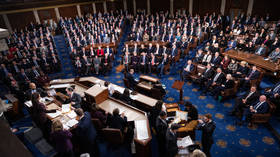‘End Austerity Now’: Protesters speak out as '250k' decry savage Westminster cuts
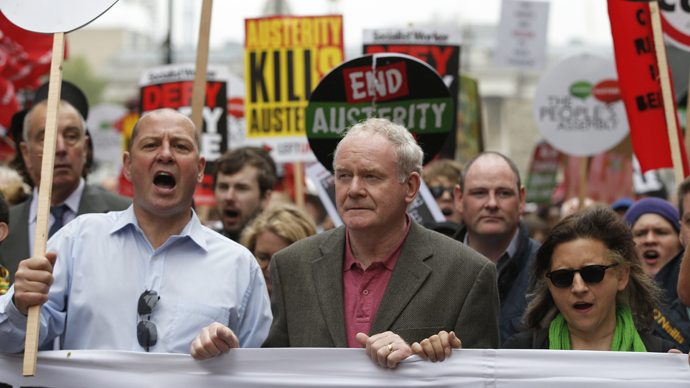
Westminster was gripped by dissent on Saturday, as around a quarter of a million protestors poured onto the streets of London, condemning austerity’s assault on human rights, the economy and the environment.
Branded a “defining moment” by Green Party leader Natalie Bennett, the mass demonstration was attended by students, economists, trade unionists, environmentalists, and social justice activists. Proud pensioners, ethnic minorities, members of the LGBT community, disability rights activists, children and MPs also formed contingents of the rally.
The protest was organized by a diverse coalition of campaigns dubbed The Peoples’ Assembly. Campaigners estimate it was attended by around 250 thousand people.
In the face of rising inequality, some protesters slammed the government’s ramped up military spending. Others lambasted Britain’s housing crisis, poverty-level wages, and slashed social safety nets.
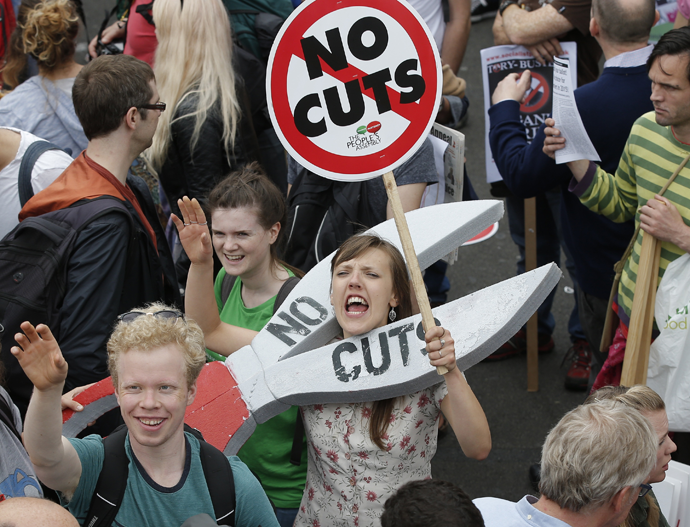
Advocates of austerity, insist high levels of national debt are dampening economic productivity because too much capital is required to service this debt. They argue that reducing the deficit is key to building a productive economy.
This argument was peddled by the Tory-Liberal Dem coalition in 2010, as it entered government. However, critics of austerity insist the coalition’s fiscal conservatism has failed, leaving Britons with an increased deficit.
Treasury chiefs have called upon the Department for Work and Pensions (DWP) to identify £15 billion ($23.8 billion) worth of welfare cuts – £3 billion ($4.7 billion) more than the Tories proposed during May’s general election race. They recently approached the Secretary of State for Work and Pensions Iain Duncan Smith, suggesting child tax credits and working tax credits could be slashed.
‘An ideologically driven attack’
RT spoke to a range of activists who attended Saturday’s demonstration. Campaigners in the protest’s Economists Against Austerity bloc said deep spending cuts are a choice, not a necessity. Downing Street is misleading voters about the need for austerity because the government can borrow capital at historically low rates, the bloc said.
“The effects of austerity cannot be overstated,” Jo Michell a lecturer in economics at the University of the West of England (UWE) told RT. “Britain has experienced the slowest post-crisis recovery on record,” he said.
Michell, who marched with the Economists Against Austerity bloc, said real wages for the average British worker have dropped by roughly 10% since the crash.
“Despite claims that we are all in it together, the burden of austerity has been disproportionately placed on the shoulders of the least well off and the most insecure,” he said.

Michell condemned the demonization of benefits claimants and said the previous government’s “attacks” on disabled Britons were “inexcusable.”“At the same time, tax breaks are given to the well-off and national assets such as the Post Office are sold off at below market value,” he said.
“None of this is necessary. There is no debt crisis,” Michell said. “Austerity is being used as a smokescreen to cover an ideologically-driven attack on the majority of the British public.”
Michell slammed Chancellor George Osborne’s economic foresight.
“There is no long-term economic plan. The Conservative government are committed to a small state and a deregulated market economy. They are opposed to economic planning,” he said.
An alternative economic model for Britain is possible, Michell said. But he insisted it would require a root-and-branch reappraisal of how the state interacts with international markets.
“Recent research has shown that the commonly held view that only the private sector can create wealth and innovate is incorrect. The public and private sectors are reliant upon each other,” he said.
"The way the system is currently configured results in a situation in which costs are socialized - borne by taxpayers - while profits are privatized. Nowhere is this more apparent than in the financial sector, which should be significantly scaled back and brought under closer control and regulation by the state."
‘Destroying communities’
Ben Pringle, who studies business and economics at Manchester University, also marched with the Economists Against Austerity bloc. He argues Britain’s post-crisis response has been woefully inadequate.
“After the financial crisis, there was an opportunity to reform the banking sector and to improve regulation. Instead of this, we have seen the government target the poor and vulnerable of Britain,” he told RT.
“There has been an astronomical rise in the use of food banks in the UK, with 913,000 food parcels given out in the last year.”
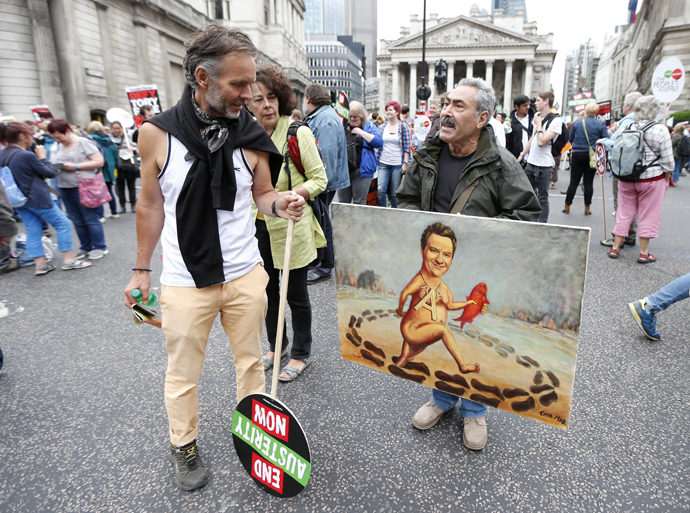
Pringle, 21, criticized the debt trap many students face and called for increased investment in Britain’s younger generations. He lamented the rise of discrimination following the introduction of austerity measures, and warned that unemployment in northern England is “destroying communities.”
“As a country, we are not creating enough jobs outside of London. We need to invest in Britain as a whole,” he said.
‘Divide and rule politics'
Campaigners marching in the demo’s Anti-racism & Anti-fascism bloc, called for a nationwide, grass roots response to austerity.
Riled by rising homelessness, inequality and the erosion of workers’ rights, the bloc accused the Tories of employing “divide and rule” politics to further their agenda. They demanded the government stop scapegoating immigrants in a bid to justify policies driven by vested interests.
Labour MPs, Green Party MPs, Left Unity representatives, trade unionists and socialists also attended Saturday’s demo.
As tens of thousands of anti-austerity campaigners gathered in London’s financial district, Labour MP Jeremy Corbyn told the BBC that Britain’s policy path must be rebalanced.
“We should not set an artificial objective of running a budget surplus in three to five years. Instead we should set objectives about reducing inequality and expanding the economy,” he said.
Corbyn, who is running in Labour's leadership race, argued such an approach could offer a win-win solution: serving the common good, while increasing tax incomes.
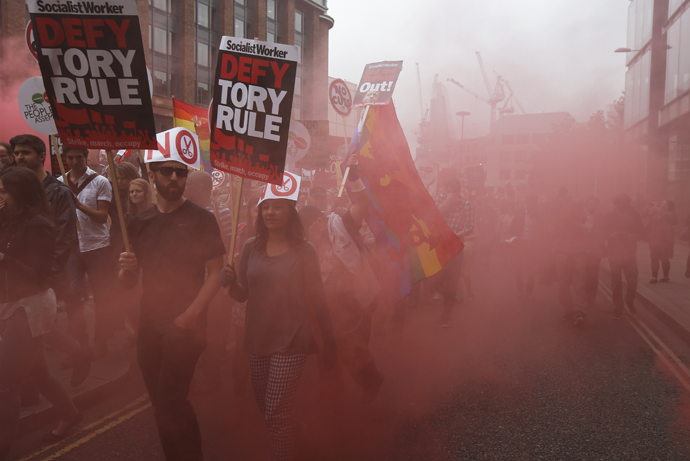
The Conservative Party says an increase in welfare cuts from £12 billion ($19 billion) to £15 billion ($23.8 billion) would allow other sectors of government spending to be ring-fenced. However, critics argue further squeezing of welfare spending would impact most severely on Britain’s working poor.
Caroline Lucas, a Green Party MP for Brighton Pavilion, said austerity is an “ideological attack on the poor.” She stressed 76 percent of the electorate did not vote for the Conservative Party.
“Osborne has no mandate for austerity. He wants to shrink the state not cut the deficit,” she said.
Lucas argued revenue could be raised in other ways such as financial transaction taxes, the scrapping of Trident and clamping down on tax dodging.
Green Party leader Natalie Bennett said austerity has forced Britain’s less privileged to pay for corrupt bankers’ greed. Addressing the crowds gathered in central London, she noted the International Monetary Fund (IMF) previously slammed Osborne’s austerity agenda.
“This is utterly the wrong direction for Britain,” she said.
‘Austerity hurts people – and the planet’
Environmental campaigners attending the demo demanded the Tories increase spending on green infrastructure, and stop cutting environment, energy and climate expenditure. They said Britain should be transitioning to a carbon-free, resource based economy, but instead is hurtling towards Victorian levels of inequality and environmental degradation.
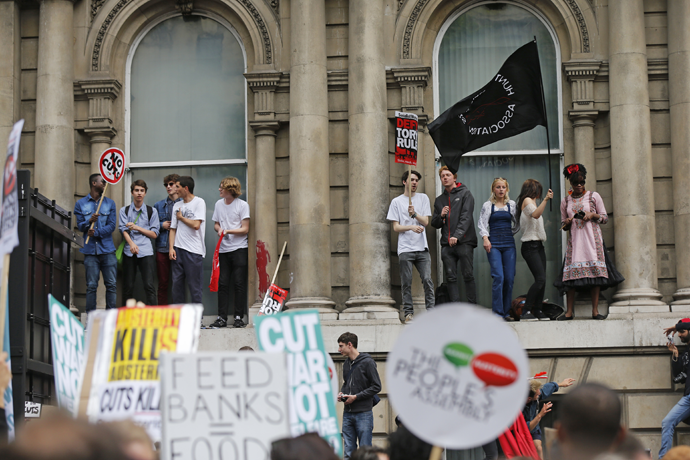
Speaking ahead of the demo, Friends of the Earth’s David Powell said austerity “hurts people and the planet.” He added that the Conservative’s policy is breeding inequality and environmental injustice.
Powell warned air pollution kills almost 30,000 people each year in the UK, hitting impoverished and marginalized communities hard. He also stressed cold weather kills 25,000 annually - a third of which die as a result of living in poorly insulated homes.
Powell called for investment in home insulation, sustainable forms of transport, and renewable energy.
‘Assault on human rights’
Disability rights campaigners in Britain have repeatedly warned spending cuts implemented since 2010 have dismantled the welfare state and impacted severely on vulnerable members of society. Social justice campaign, Disabled People Against Cuts’ (DPAC), denounced the welfare reforms implemented under the previous government.
DPAC’s Anita Bellows told RT benefits caps and benefits sanctions have been detrimental for Britain’s most vulnerable. The DPAC campaigner, who suffers from a disability, noted a Supreme Court ruling in March found the state’s benefits cap is legal - even in cases where it violates international law.
Supreme Court judges criticized the cap for breaching the United Nation’s (UN) Convention on the Rights of the Child at the time. But the Court failed to overturn the policy, saying the issue must be dealt with by Westminster.
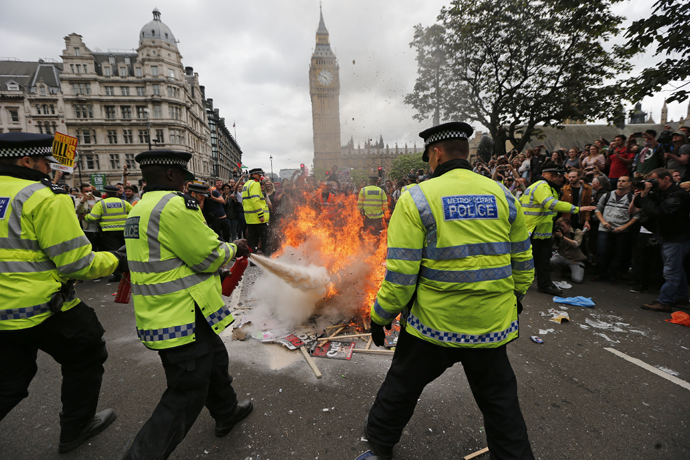
Currently standing at £26,000 ($41,000), the benefits cap will soon plummet to £23,000 ($36,500). This sum covers housing benefit along with benefits for children.
Bellows argued benefits sanctions on single parent families also culminate in the violation of children’s rights.
The government insists sanctioned claimants, who fail to meet government requirements, are entitled to hardship payments. But Bellows argues the state’s failure to inform sanctioned claimants of this hardship fund creates human suffering.
The government vowed to publish figures detailing these hardship allowances in May 2015, during a public inquiry into state welfare reforms. The stats are yet to materialize.
Earlier this month, more than 58,000 people signed a petition demanding the release of figures detailing the number of disabled people to die within six weeks of having their benefits cut. The government has sought to block their publication.
“One way to ensure less inequality is to have a human rights approach to welfare and to ensure that claimants are getting a level of benefits which ensures a decent life,” Bellows said.
Observers predict a continuation of pro-establishment policies that bolster the interests of banks, big business and the elite. Nevertheless, campaigners continue to forge a grassroots response to austerity.





